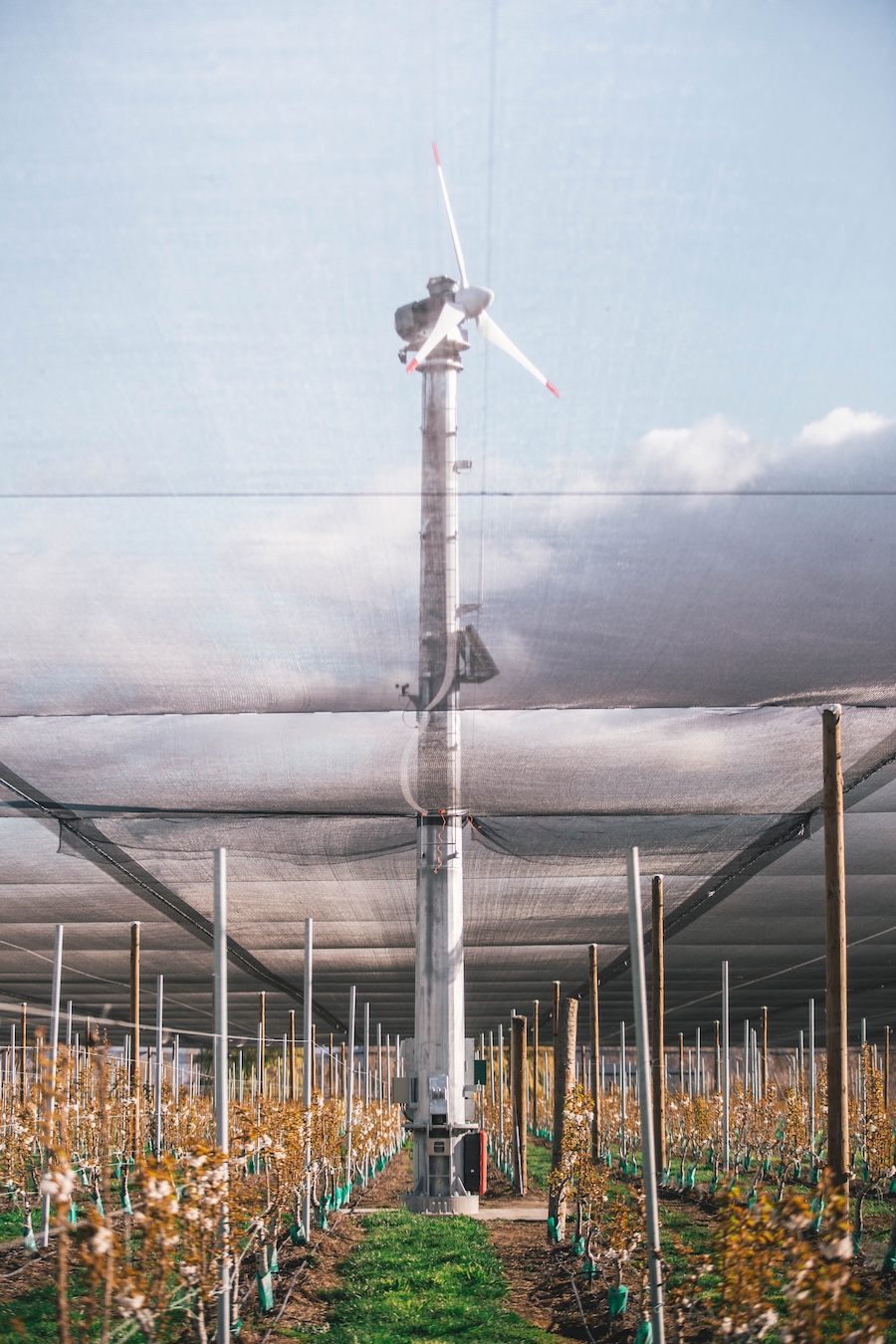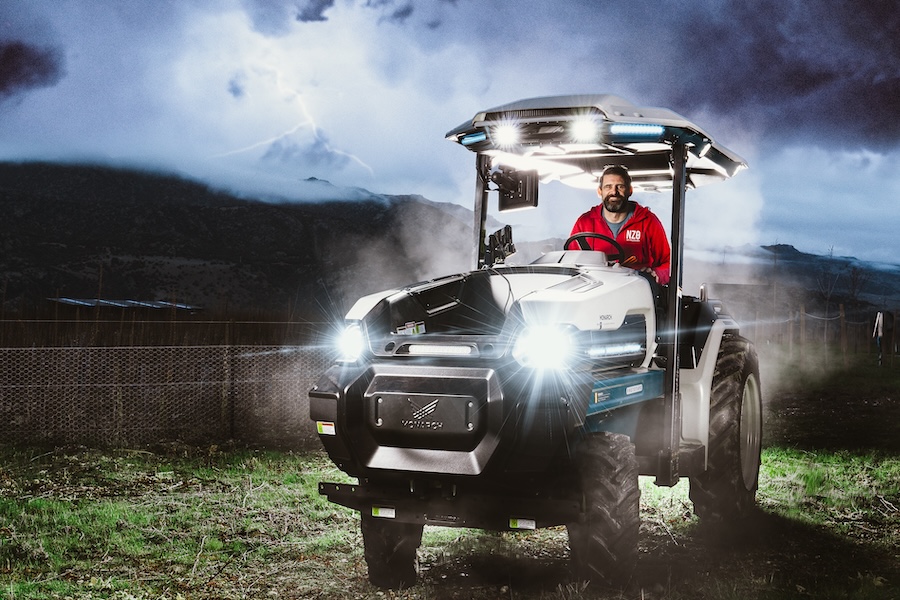Power shift
Pictured above: Mike Casey.
Mike Casey, CEO of Rewiring Aotearoa and winner of the Transformational Leadership Award at the Sustainable Business Awards 2024, is driving New Zealand’s electrification revolution, proving it’s not just sustainable but smart business.
In just over a year, Rewiring Aotearoa has made an outsized impact on New Zealand’s electrification journey, advocating for practical, cost-effective solutions that slash emissions and empower businesses and households alike. At the helm of this movement is Mike Casey, a transformative entrepreneur who turned his personal commitment to sustainability into a national movement.
From launching innovative tools like the household electrification calculator to showcasing the economic potential of the world’s first all-electric cherry orchard, Mike and his team are proving that electrification isn’t just an environmental imperative – it’s a smart financial choice. We caught up with Mike on the back of his win of the Transformational Leadership Award at the Sustainable Business Awards 2024 to discuss his leadership philosophy, the milestones driving Rewiring Aotearoa’s success, and his vision for a fully electrified Aotearoa.
Q: What does winning the Transformational Leadership mean for the goals of Rewiring Aotearoa?
MC: We’re all about rapid transformation at Rewiring Aotearoa. And we believe we are leading a new, more positive movement in the climate space, so it aligns very well. The award wouldn’t have been possible without the support of our funders and, as I said in my acceptance speech, I am a megaphone for the amazing work our team does.
Taking on the role at Rewiring Aotearoa has allowed me to scale up the electrification message that the orchard has demonstrated. So many people have been so impressed by Rewiring’s sudden and dramatic rise and the impact we’re having, both among homeowners and decision-makers. The transformation is only just starting.
Q: How did your own electrification journey begin?
MC: I can trace my electrification journey back to 2007 when I co-founded a business called GradConnection in Australia. It was sold to Seek in 2019 and my wife and I wanted to put some of our proceeds to good use and do something about climate change back home in New Zealand. We ended up buying some land near Cromwell and decided to plant a cherry orchard.
We thought planting lots of cherry trees was a pretty good option as far as climate action went. Luckily, we hired climate scientist Carly Green to prove just how worthy we were and her calculations showed that planting 9,300 of them would remove about three tonnes of CO2 emissions per year. Not too bad, but there was another much bigger number she gave us that caught our attention: if we ran the orchard in the traditional manner and bought diesel tractors, motorbikes, sprayers and frost-fighting fans, we would be pumping out around 50 tonnes of carbon emissions each year, or about 18 times the carbon we’d be sucking up via our trees.
We decided to ditch the diesel and gas and go fully electric, and we’ve been really transparent about the numbers. It’s a tribute to the power of a demonstration project and over 12,000 people have visited the orchard to see how it all works, including a lot of sceptical conservative farmers who tend to leave thinking it’s just a smart business decision.
Q: What does the word leadership mean to you in the context of climate action?
MC: As an organisation, we are always learning, and always want to find where we are wrong and where we can improve. But we are also helping other organisations learn too, giving them new perspectives that will drive even more impact over time. Other organisations have already said this about us, that we have given them new perspectives that change how they operate. We want to change perspectives and show people there is a solution, we just need to prioritise things, focus on our fuels and opt for substitution before sacrifice.
Q: How have you developed your own leadership skills in leading Rewiring Aotearoa?
MC: I have, like any new leader, suffered from my fair share of imposter syndrome. A leadership coach has definitely helped me to identify where my super powers are and build a team that allows me to maximise my strengths by backing me up in areas where I am weaker.
The biggest thing I have learnt about leadership is that it’s really about inspiring people, and I have found I tend to be quite good at that!
Q: What support have you received from the Sustainable Business Network?
MC: The SBN team has been a great supporter of Rewiring Aotearoa’s mahi and I presented at a couple of their events this year. Our work is focused on electrification as we believe it’s the best bet for the climate and it’s also good business. That’s sustainability done two ways.
While the award is great we have not shifted the dial on emissions yet, and therefore it’s important we stay grounded and focused on our mission.

Q: The judges highlighted your advocacy for electrification and your all-electric cherry orchard as a model for sustainable agriculture. What inspired you to start this project?
MC: Forest Lodge has definitely influenced other farmers to consider electric options and I’m constantly offering advice to farmers who are keen to get solar and batteries installed and reduce their costs. As an entrepreneur, the world’s first electric orchard was a great achievement, but I’m always looking for ways to scale my impact and I truly believe New Zealand can become the world’s most electric economy, with more global firsts like Jeff Collings electric chicken farm, electric milk, electric kiwifruit and electric wine.
Q: Rewiring Aotearoa emphasises reducing costs and emissions through electrification. Can you share some specific milestones or projects from the past year that have had the biggest impact?
MC: There are so many. Our Electric Homes report really kicked things off and showed that New Zealand is one of the first places in the world to reach the electrification tipping point, where upgrading to electric machines is cheaper than fossil fuel machines over their lifetime and also slashes emissions.
We followed that up with a report that looked at the potential for Electric Farms to save money and play a role in our energy system and then showed how big the electrification opportunity was for New Zealand as a whole with Investing in Tomorrow ($11 billion per year saved by 2040 or a cumulative $95 billion saved by households by 2040 if we committed to going fully electric.) That’s 30 Dunedin hospitals worth of savings – and the country cannot even afford one of those. That shows you just how much foreign energy is a leach on our economy.
We have also created lots of helpful material on our website to answer questions and help households electrify and we recently launched our household calculator, which is a helpful tool for New Zealanders to plug in their own info, see the savings and make it happen.
Q: One of your goals is to help New Zealand households save money through electrification. Can you provide examples of how your work has directly improved energy affordability for families or businesses?
MC: Education is a big part of what we do so letting New Zealanders know that they will save money in the long run if they upgrade to electric machines is crucial. The awareness of this message has certainly grown since we arrived on the scene around one year ago and adoption rates are ticking up. We have also focused heavily on rooftop solar, because it is the cheapest electricity New Zealand households can get, even if you add it to your mortgage.
We are working closely with the regulators and politicians to level the playing field and make solar and batteries even more beneficial and we’re confident these changes will be made.
Q: Electrification in New Zealand still faces challenges, such as reliance on fossil fuels for two-thirds of energy needs. What are the biggest obstacles to scaling up electrification nationwide, and how do you propose overcoming them?
MC: The upfront costs are still the biggest barrier, which is why we are working with the private and public sector to create better finance schemes that allow everyone – no matter their income – to access the cost-savings of electric technology. We need to swap fuels for finance.
The energy sector will be part of the solution but, at the moment, it’s slowing things down. Things like solar, batteries and EVs make customers part of New Zealand’s infrastructure and we need the market to be truly open and fair so everyone can participate and add value. This is how we build out the lowest cost energy system for New Zealanders
Q: Electrification has implications beyond the environment, touching on community resilience and energy equity. How does Rewiring Aotearoa address these social dimensions?
MC: Electrification is about people and it is a fundamentally better way to power our lives and livelihoods. By comparison to fossil fuel energy, renewable energy is cheaper, cleaner, more efficient, more abundant and more resilient over the long run. Consequently, the electrification of everything is set to enhance human wellbeing in various ways, often with immediate benefits.
If someone invented a machine that removes greenhouse gases from the atmosphere at an industrial scale and therefore ‘fixes’ climate change, would electrification still be worth doing?
Our answer is ‘hell yeah!’ because electrifying everything can improve human wellbeing along multiple metrics. This depends on how we roll out the energy transition, and on whether we design energy markets, supply chains and policy mixes to avoid inequity and injustice. But if we get ahead of the curve, we can ensure that everyone enjoys the benefits of electrification, now and into the future.
This article was originally published in the December 2024 issue of NZBusiness magazine. To read the issue, click here.



